Flag of the Canary Islands
The flag of the Autonomous Community of the Canary Islands is a vertical tricolour of three equal bands of white, blue, and yellow. The state flag includes the Coat of arms of the Canary Islands in the central band; the civil flag omits this. The designs were made official by the Statute of Autonomy of the Canarian Autonomous Community (Organic Law 10/82) on 16 August 1982.
.svg.png)

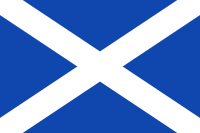
History and meaning
The tricolour flag has its origins in the Canarias Libre movement of the 1960s. It was designed by Carmen Sarmiento and her sons Arturo and Jesus Cantero Sarmiento, and first displayed (in paper form) on 8 September 1961. It combined the blue and white colours of the Province of Santa Cruz de Tenerife (Province of Canary Islands) with the blue and yellow colours of the Province of Las Palmas.[1]
Colours
The colours of the flag as specified by the Canarian Government are the following:[2]
| Pantone | CMYK colour model | RGB colour model | Web colours | ||||||
|---|---|---|---|---|---|---|---|---|---|
| Colour | Identification | C | M | Y | K | R | G | B | HTML code |
| White* | Not specified | 0% | 0% | 0% | 0% | 255 | 255 | 255 | #FFFFFF |
| Blue | 3005 | 100% | 35% | 0% | 0% | 7 | 104 | 169 | #0768A9 |
| Yellow | 7406 | 0% | 20% | 100% | 0% | 255 | 204 | 0 | #FFFF00 |
*Assumed to be pure white due to it not being specified exactly.
Flags of the provinces
The Spanish Provinces of Santa Cruz de Tenerife and Las Palmas do not have a flag.
Island flags
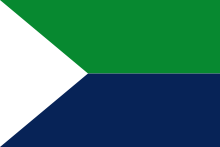 Flag of El Hierro
Flag of El Hierro Flag of La Palma
Flag of La Palma Flag of La Gomera
Flag of La Gomera Flag of Tenerife
Flag of Tenerife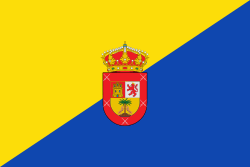 Flag of Gran Canaria
Flag of Gran Canaria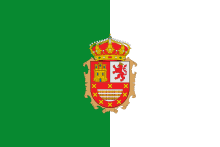 Flag of Fuerteventura
Flag of Fuerteventura Flag of Lanzarote
Flag of Lanzarote
Other versions
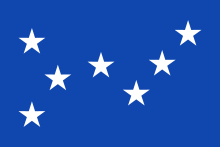 "Ateneo Flag", the first Canarian nationalist flag. The seven stars represent the seven islands of the archipelago
"Ateneo Flag", the first Canarian nationalist flag. The seven stars represent the seven islands of the archipelago The flag proposed by the CIIM.
The flag proposed by the CIIM.
References
External links
- Canary Islands at Flags of the World
- Banderas de Canarias by José Manuel Erbez.
- Canary Islands Flag - History & Meaning by Guide to Canary Islands